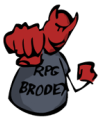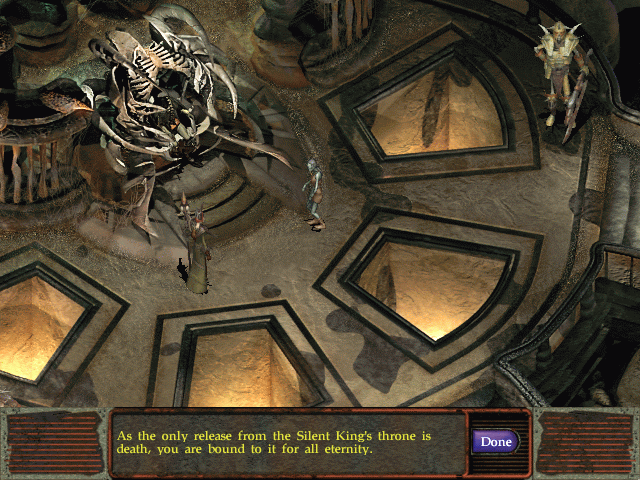Tags: Colin McComb; InXile Entertainment; Planescape: Torment; Torment: Tides of Numenera
To this day, Black Isle's Planescape: Torment is widely regarded as video gaming's most finely crafted narrative. It goes without saying, then, that it won't be easy for InXile's spiritual successor to Torment, Torment: Tides of Numenera, to live up to its predecessor's reputation. On the other hand, Planescape: Torment's amazing story came packaged alongside a fair share of problems, such as weak combat and a number of poorly designed areas. In this interview, esteemed community member grotsnik talks to Torment 2's creative lead, Colin McComb, about the approach Colin takes in designing and writing for the game so it can live up to the hype, as well as in addressing the weaker parts of Torment: Tides of Numenera's illustrious predecessor. Have a snippet:
Read the full interview: RPG Codex Interview: Colin McComb on Writing for Torment: Tides of Numenera
To this day, Black Isle's Planescape: Torment is widely regarded as video gaming's most finely crafted narrative. It goes without saying, then, that it won't be easy for InXile's spiritual successor to Torment, Torment: Tides of Numenera, to live up to its predecessor's reputation. On the other hand, Planescape: Torment's amazing story came packaged alongside a fair share of problems, such as weak combat and a number of poorly designed areas. In this interview, esteemed community member grotsnik talks to Torment 2's creative lead, Colin McComb, about the approach Colin takes in designing and writing for the game so it can live up to the hype, as well as in addressing the weaker parts of Torment: Tides of Numenera's illustrious predecessor. Have a snippet:
It’s often argued that PS:T suffers from a drop in quality from Curst through to Carceri, when the player’s no longer free to explore the hubs of Sigil but instead has to work their way through a succession of smaller, wilder locations with a far higher number of hostile creatures. As a writer, how exactly do you go about trying to pace a game where the player can leap from world to world and spend longer inside one conversation tree than an entire dungeon?
A large part of this is defining our base storyline and the behavior of our NPCs within those modules. Right now we’re establishing our constraints and briefs for area design, and we’re planning of the relative size, in terms of gameplay, for each section of the game. We’re also working on character and Mere placement and number and size of dialogues. At some point, even the most completionist of players are going to decide they’ve wrung every bit of reactivity out of an area and move on. But some choices are mutually exclusive, and we don’t see it as a possibility that you’ll be able to experience the entirety of the game in a single playthrough. In fact, I don’t think you’ll get it on two.
Now, I should mention that we don’t see it as our job to make sure people move along at the pace we’ve dictated. We’re designing the story so that people can progress through the mainline at their own pace, while trying to keep the sense of urgency on the story.
But the real answer to the question is that we’re designing the game so that you can go back to areas and explore at your own pace, though you’ll start to have difficulties if you stagnate too long in one place. I see that’s the next question, though, so I’ll save further discussion for that question.
It's often held that the combat in PS:T left a great deal to be desired not only in its mechanics, but also in the sense of (to air videogame theory's most impressive-sounding new buzzphrase) ludonarrative dissonance; in that whether you were murdering your way through the Tenement of Thugs just to get to the alleyway on the other side or bashing entire swarms of mindless critters in the Weeping Catacombs or Curst Underground, fighting frequently came across as arbitrary obstacle-placing, rather than relevant to what the player character was trying to achieve in the game's narrative. Without delving into the undecided technical side of things, how would you want to go about ensuring that the combat never feels disjointed from the story?
Combat should be a part of the story, whether to indulge or to avoid. It should always serve the purpose of moving your understanding of your character ahead, and that’s one of the ways we fell down on PST. Kevin, Adam, and I have talked about this fairly extensively, and we agree that our combats should serve a narrative purpose, and that avoiding those combats will help reveal more about your character as well—whether you talk your way out of fighting or flee from your foe, you’ll create a picture of who you are in this game.
So trash mobs won’t be prevalent in Torment. No random gangsters deciding that you look like a prime target. No killing rats for XP. I’m not saying that we won’t have any mindless fights, just that trouble won’t always come looking for you to ruin your non-combat playthrough. In Numenera as well, you don’t get XP for killing monsters, so combat becomes optional – your XP comes from telling a story, from solving problems, from being clever players. We are enjoying exploring in that vein.
A large part of this is defining our base storyline and the behavior of our NPCs within those modules. Right now we’re establishing our constraints and briefs for area design, and we’re planning of the relative size, in terms of gameplay, for each section of the game. We’re also working on character and Mere placement and number and size of dialogues. At some point, even the most completionist of players are going to decide they’ve wrung every bit of reactivity out of an area and move on. But some choices are mutually exclusive, and we don’t see it as a possibility that you’ll be able to experience the entirety of the game in a single playthrough. In fact, I don’t think you’ll get it on two.
Now, I should mention that we don’t see it as our job to make sure people move along at the pace we’ve dictated. We’re designing the story so that people can progress through the mainline at their own pace, while trying to keep the sense of urgency on the story.
But the real answer to the question is that we’re designing the game so that you can go back to areas and explore at your own pace, though you’ll start to have difficulties if you stagnate too long in one place. I see that’s the next question, though, so I’ll save further discussion for that question.
It's often held that the combat in PS:T left a great deal to be desired not only in its mechanics, but also in the sense of (to air videogame theory's most impressive-sounding new buzzphrase) ludonarrative dissonance; in that whether you were murdering your way through the Tenement of Thugs just to get to the alleyway on the other side or bashing entire swarms of mindless critters in the Weeping Catacombs or Curst Underground, fighting frequently came across as arbitrary obstacle-placing, rather than relevant to what the player character was trying to achieve in the game's narrative. Without delving into the undecided technical side of things, how would you want to go about ensuring that the combat never feels disjointed from the story?
Combat should be a part of the story, whether to indulge or to avoid. It should always serve the purpose of moving your understanding of your character ahead, and that’s one of the ways we fell down on PST. Kevin, Adam, and I have talked about this fairly extensively, and we agree that our combats should serve a narrative purpose, and that avoiding those combats will help reveal more about your character as well—whether you talk your way out of fighting or flee from your foe, you’ll create a picture of who you are in this game.
So trash mobs won’t be prevalent in Torment. No random gangsters deciding that you look like a prime target. No killing rats for XP. I’m not saying that we won’t have any mindless fights, just that trouble won’t always come looking for you to ruin your non-combat playthrough. In Numenera as well, you don’t get XP for killing monsters, so combat becomes optional – your XP comes from telling a story, from solving problems, from being clever players. We are enjoying exploring in that vein.
Read the full interview: RPG Codex Interview: Colin McComb on Writing for Torment: Tides of Numenera







![Have Many Potato [2013] Codex 2013](/forums/smiles/campaign_tags/campaign_potato2013.png)
![The Year of Incline [2014] Codex 2014](/forums/smiles/campaign_tags/campaign_incline2014.png)























![Glory to Codexia! [2012] Codex 2012](/forums/smiles/campaign_tags/campaign_slushfund2012.png)









